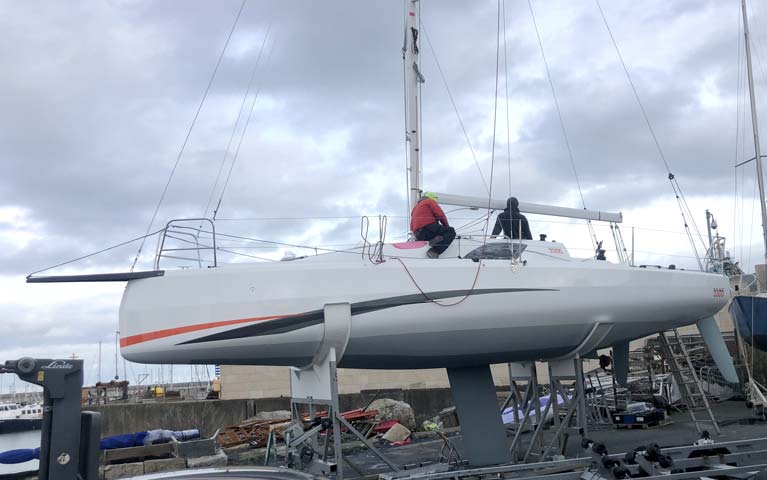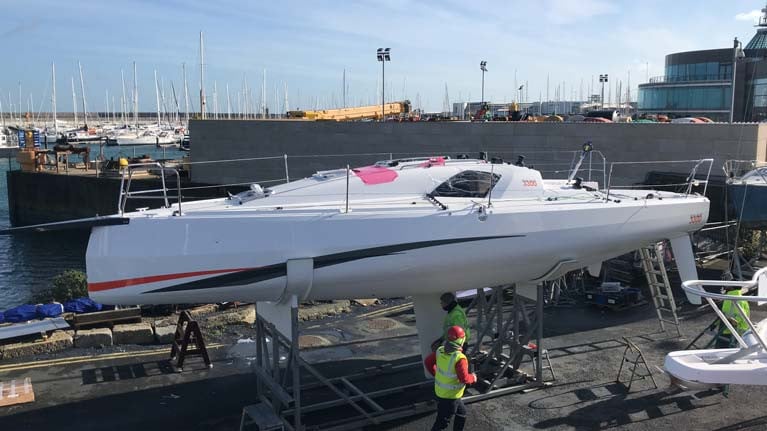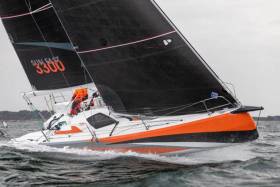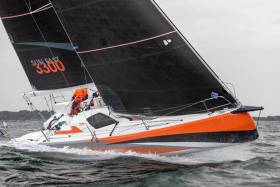Displaying items by tag: Sun Fast 3300
New Sun Fast 3300 Model Arrives in Ireland
MGM Boats is launching the new Jeanneau Sun Fast 3300 at the Royal Irish Yacht Club in Dun Laoghaire on Friday 6th March at 7 pm.
The Sun Fast 3300 made an impressive debut in the Fastnet race last year and the new French marque is proving to be an exciting and multipurpose performance race boat.
In the line-up for the Olympic Boat Selection for 2024 - it is also an IRC performer, fully crewed or in a shorthanded set-up.
As Afloat previously reported, now in full production, it has confirmed orders for fleets in the Solent, France and in the States – this is the first Sun Fast 3300 in Ireland.
 The first Sunfast 3300 is prepared for her March launch at the MGM Boatyard
The first Sunfast 3300 is prepared for her March launch at the MGM Boatyard
Jeanneau, fully behind the team at MGM Boats, is sending over members of the Sun Fast Design Team and will make a presentation on the Sun Fast 3300 at 1900 in the Royal Irish Yacht Club. They will also be available to answer any questions.
Joining the Sun Fast 3300 on display will be its larger stablemate the Sun Fast 3600.
Both boats will be on display on Friday the 6th from 1400 until 1900 and on Saturday the 7th from 1000 until 1300 on the Royal Irish pontoon.
As spaces are limited if you wish to attend this event or to arrange a viewing please email [email protected]
Great Deals & Training On New Sun Fast 3300 With MGM Boats
MGM Boats are promising great deals on early orders for the new Sun Fast 3300 which is entering production this autumn in time for the 2020 sailing season.
This follows the successful introduction of Jeanneau’s new model — “a bold racing boat, without compromise, designed for success” — to racing fleets in Europe this summer.
The Dun Laoghaire yacht brokers have also pledged to provide ongoing technical support and training to help any level of owner and sailing team reach their goals with the Sun Fast 3300.
The existing Sun Fast 3600 fleet benefited tremendously from MGM Boats’ on-the-water and in-the-classroom training programme last autumn and winter, which involved a panel and coaches and the support of North Sails and UK/McWilliam Sailmakers.
The new Sun Fast 3300 will be on display at the Southampton International Boat Show from this Friday 13 September — contact MGM Boats at [email protected] to arrange a viewing appointment and get all the information on the Sun Fast promotion and programme.
Live Chat With Jeanneau On New Sun Fast 3300
Jeanneau development chief Hervé Piveteau is answering questions in a YouTube live chat today (Monday 27 May) about the new Sun Fast 3300 as its latest video hyping the new craft is premiered.
Described by the French yacht builder as “a bold racing boat, without compromise, designed for success”, the Sun Fast 3300 was launched last December at the Paris Boat Show to great acclaim.
Irish Jeanneau agents MGM Boats were on hand for the unveiling of the new design from naval architechts Daniel Andrieu and Guillaume Verdier, with high-performance features including a double concave hull.


























































